- Home
- Kristin Cashore
Fire Page 4
Fire Read online
Page 4
“Are you warm enough? Take my coat.”
They sat for a while on the steps of the terrace, Fire wrapped in Archer’s coat. They talked about Archer’s plans for breaking ground in the fields. Soon enough it would be time for the spring planting, and northern soil, rocky and cold, always resisted the start of a new growing season.
Now and then Fire sensed a raptor monster overhead. She kept her own mind hidden from them so they wouldn’t recognize her for the monster prey she was; but of course, in the absence of monster prey, they ate any living creature available. One that spotted Fire and Archer dropped down and began to circle, posing shamelessly, intangibly lovely, reaching for their minds, radiating a feeling that was hungry, primitive, and oddly soothing. Archer stood and shot it, then shot another that did the same, the first violet like sunrise, the second so pale a yellow it looked like the moon dropping from the sky.
At least fractured on the ground, Fire thought, the monsters added color to the landscape. There was little color in the north of the Dells in early spring—the trees were gray and the grass that tufted between cracks in the rocks was still brown from winter. Truly, even at the height of summer the north of the Dells was not what one would call colorful, but at least in summer, gray with patches of brown turned to gray with patches of green.
“Who found the poacher, anyway?” Fire asked idly.
“Tovat,” Archer said. “One of the newer guards. You’ll not have met him yet.”
“Oh, yes—the young one with the brown-orange hair that people called red. I like him. He’s strong-minded and he guards himself.”
“You know Tovat? You admire his hair, do you?” Archer said in a sharp and familiar tone.
“Archer, honestly. I said nothing of admiring his hair. And I know the names and faces of all the men you station at my house. It’s simple courtesy.”
“I won’t be stationing Tovat at your house any longer,” he said, an unpleasant edge to his voice that drove her to silence for a moment, so that she wouldn’t say anything unpleasant back about Archer’s dubious—and rather hypocritical—right to jealousy. He opened a feeling to her that she didn’t particularly care to feel just now. Biting back a sigh, she chose words that would protect Tovat.
“I hope you’ll change your mind. He’s one of the few guards who respects me both with his body and in his mind.”
“Marry me,” Archer said, “and live in my house, and I will be your guard.”
She could not bite back this sigh. “You know that I won’t. I wish you would stop asking me.” A fat raindrop plopped onto her sleeve. “I think I’ll go visit your father.”
She stood, creaking with pain, and let his coat slide off into his lap. She touched his shoulder once, gently. Even when she did not like Archer, she loved him.
As she went into the house, rain began to fall.
ARCHER’S FATHER LIVED in Archer’s house. Fire asked a guard who was not Tovat to accompany her along the path through the rain. She carried a spear, but still, without her longbow and quiver she felt naked.
Lord Brocker was in his son’s armory, thundering instructions at a large man Fire recognized as the assistant to the blacksmith in town. At the sight of her Lord Brocker did not let off his thundering, but momentarily he lost the attention of his listener. The blacksmith turned to stare at Fire, some base thing in his eyes and in his silly, stupid smile.
He’d known Fire for long enough, this man, to have learned how to guard himself against the power of her strange monster beauty, so if he was not guarding himself, then he must not want to. His prerogative, to give up his mind in return for the pleasure of succumbing to her, but not something she cared to encourage. She kept her headscarf on. She pushed his mind away and walked past him into a side room so that she couldn’t be seen. A closet really, dark, with shelves full of oils and polish and ancient, rusted equipment no one ever used.
It was humiliating to have to retreat to a smelly old closet. The blacksmith should be the one to feel humiliated, for he was the dunce who chose to give up his self-control. What if while he gaped at her and imagined whatever his small mind cared to imagine, she convinced him to draw his knife and take out his own eye? It was the sort of thing Cansrel would have liked to do. Cansrel had never retreated.
The men’s voices stopped and the blacksmith’s mind receded from the armory. The big wheels of Lord Brocker’s chair squeaked as he rolled himself toward her. He stopped in the doorway of the closet. “Come out of there, child; he’s gone. The moron. If a mouse monster stole that one’s meal from under his nose, he’d scratch his head and wonder why he couldn’t remember eating his food. Let’s go to my rooms. You look like you should sit down.”
Archer’s house had been Brocker’s house before Brocker had turned the running of the estate over to his son, and Brocker had used a wheeled chair before Archer had ever been born. The house was organized such that everything but Archer’s rooms and servant rooms were on the first floor, where Brocker could reach them.
Fire walked beside him down a stone hallway that was dim in the gray light seeping through tall windows. They passed the kitchen, the dining room, the stairway, and the guard room. The house was full of people, servants and guards coming in from outside, coming down from upstairs. The servant girls who passed them greeted Brocker but carefully ignored Fire, their minds guarded and cool. As always. If Archer’s servants did not resent her because she was a monster and Cansrel’s daughter, they resented her because they were in love with Archer.
Fire was happy to sink into a soft chair in Lord Brocker’s library and drink the cup of wine an unfriendly servant clapped into her hand. Brocker positioned his chair across from hers and settled his gray eyes on her face. “I’ll leave you alone, dear,” he said, “if you wish to nap.”
“Perhaps later.”
“When’s the last time you had a good night’s sleep?”
Brocker was one person she felt comfortable admitting pain to, and fatigue. “I can’t remember. It’s not a thing that happens very often.”
“You know there are drugs that will put you to sleep.”
“They make me groggy, and stupid.”
“I’ve just finished writing a history of military strategy in the Dells. You’re welcome to take it with you. It’ll put you to sleep while making you clever and unbeatable.”
Fire smiled and sipped the bitter Dellian wine. She doubted that Brocker’s history would put her to sleep. All she knew about armies and war came from Brocker, and he was never boring. Twenty-some years ago, in the heyday of old King Nax, Brocker had been the most brilliant military commander the Dells had ever seen. Until the day King Nax had seized him and shattered his legs—not broken them, but shattered them, eight men taking turns with a mallet—and then sent him home, half-dead, to his wife, Aliss, in the northern Dells.
Fire didn’t know what terrible thing Brocker had done to justify such treatment from his king. Neither did Archer. The entire episode had taken place before they were born, and Brocker never spoke of it. And the injuries were only the beginning of it, for a year or two later, when Brocker had recovered as well as he ever would, Nax had still been angry with his commander. He’d handpicked a brute from his prisons, a dirty, savage man, and sent him north to punish Brocker by punishing Brocker’s wife. This was why Archer was brown-eyed, light-haired, handsome, and tall, while Brocker was gray-eyed and dark-haired and plain in appearance. Lord Brocker was not Archer’s true father.
In some places and times Brocker’s would have been a mind-boggling story, but not in King’s City and not in the days when King Nax had ruled at the pleasure of his closest adviser. Cansrel.
Brocker spoke, interrupting her gruesome thoughts. “I understand you’ve had the rare pleasure of being shot by a man who was not trying to kill you,” he said. “Did it feel any different?”
Fire laughed. “I’ve never been shot more pleasantly.”
He chuckled, studying her with his mild eyes. “It’s
rewarding to make you smile. The pain in your face drops away.”
He had always been able to make her smile. It was a relief to her, his dependable light mood, especially on days when Archer’s mood was heavy. And it was remarkable, since every moment he was in pain.
“Brocker,” she said. “Do you think it could have been different?”
He tilted his head, puzzled.
“I mean Cansrel,” she said, “and King Nax. Do you think their partnership could ever have been different? Could the Dells have survived them?”
Brocker considered her, his face gone quiet and grave at the very mention of Cansrel’s name. “Nax’s father was a decent king,” he said. “And Cansrel’s father was a valuable monster adviser to him. But, darling, Nax and Cansrel were two other creatures entirely. Nax didn’t inherit his father’s strength, and you know as well as anyone that Cansrel didn’t inherit even a touch of his father’s empathy. And they grew up together as boys, so when Nax took the throne, he’d already had Cansrel living inside his head his whole life. Oh, Nax had a good heart, I’m sure of it—sometimes I saw it—but it didn’t matter, because he was also just the smallest bit lazy, the smallest bit too willing to let someone else do his thinking—and that was all the opening Cansrel ever needed. Nax never had a chance,” Brocker said, shaking his head, squinting at memories. “From the start, Cansrel used Nax to get everything he wanted, and all Cansrel ever wanted was his own pleasure. It was inevitable, sweetheart,” he said, bringing his attention back to her face. “As long as they lived, Cansrel and Nax were always going to lead the kingdom to ruin.”
Ruin. Fire knew, for Brocker had told her, the progressive steps that had led to ruin once young Nax had taken the throne. It had started with women and parties, and that hadn’t been so bad, for Nax had fallen in love with a black-haired lady from the northern Dells named Roen and married her. King Nax and Queen Roen had produced a son, a handsome, dark boy named Nash, and even with a somewhat neglectful king at its helm the kingdom had had an aura of stability.
Except that Cansrel had been bored. His gratification had always required excess, and now he began to need more women and more parties, and wine, and children from the court to alleviate the monotony of the women. And drugs. Nax had agreed to it all; Nax had been like a shell to hold Cansrel’s mind and nod its head yes to whatever Cansrel said was best.
“Yet, you’ve told me that ultimately it was the drugs that destroyed Nax,” Fire said. “Could Nax have held on if it hadn’t been for the drugs?”
“Perhaps,” Brocker said lightly. “Cansrel could always keep hold of himself with poison in his veins, blast him, but Nax couldn’t; it made him high-strung, and paranoid, and uncontrolled, and more vindictive than he’d ever been before.”
He stopped at that, staring bleakly at his own useless legs. Fire kept her feeling tight within herself so that he would not be flooded with her curiosity. Or her pity; her pity must never touch him.
A moment later he looked up and held her eyes again. He smiled very slightly. “Perhaps it would be fair to say that Nax mightn’t have turned into a madman if it weren’t for the drugs. But I believe the drugs were as inevitable as the rest. And Cansrel himself was the truest drug to Nax’s mind. People saw what was happening—they saw Nax punishing law-abiding men and making alliances with criminals and wasting all the money in the king’s coffers. Allies of Nax’s father began to withdraw their support for Nax, as they were bound to do. And ambitious fellows like Mydogg and Gentian began to think and plot, and train squadrons of soldiers, under the guise of self-defense. And who could blame a mountain lord for that, with things so unstable? There was no law anymore, not outside the city, for Nax couldn’t be troubled to attend to it. The roads were no longer safe, you had to be mad or desperate to travel the underground routes, looters and raiders and black-market thugs were cropping up everywhere. Even the Pikkians. For ages, they’d been content to squabble among themselves. Now, suddenly, even they couldn’t resist taking advantage of our lawlessness.”
Fire knew all of this; she knew her own history. In the end, a kingdom connected by underground tunnels and riddled with caves and hidden mountain holdings could not bear so much volatility. There were too many places for bad things to hide.
Wars had broken out in the Dells; not proper wars with well-defined political adversaries, but bungling mountain turf wars, one neighbor against another, one party of cave raiders against some poor lord’s holding, one alliance of Dellian lords against the king. Brocker had been in charge of quelling all uprisings, all across the Dells. He’d been a far better military leader than Nax had deserved, and for several years, Brocker had done an impressive job of it. But he and the army had been on their own; in King’s City, Cansrel and Nax had been busy, plowing their way through women and drugs.
King Nax had fathered a set of twins with a palace laundry girl. Then Brocker had committed his mysterious offense, and Nax had retaliated. And on the day that Nax had destroyed his own military commander, he’d dealt a fatal blow to any hope of rule in his kingdom. The fighting had burgeoned out of control. Roen had borne Nax another dark-haired son named Brigan. The Dells had entered a desperate time.
CANSREL HAD QUITE enjoyed being surrounded by desperation. It had entertained him to smash things apart with his power, and for entertainment he’d been insatiate.
The few women Cansrel couldn’t seduce with the power of his beauty or his mind, he raped. The few women Cansrel impregnated he killed. He didn’t want monster babies growing into monster children and adults who might undermine his power.
Brocker had never been able to tell Fire why Cansrel hadn’t killed Fire’s mother. It was a mystery; but she knew better than to hope for a romantic explanation. Fire had been conceived in a time of depraved pandemonium. Cansrel had probably forgotten he’d taken Jessa to his bed, or never noticed the pregnancy—she was only a palace servant, after all. He’d probably not realized the pregnancy was his, until the child had been born with hair so astonishing that Jessa had named her Fire.
Why had Cansrel allowed Fire to live? Fire didn’t know the answer to that, either. Curious, he’d gone to see her, probably intending to smother her. But then, looking into her face, listening to the noises she made, touching her skin—absorbing her tiny, intangible, perfect monsterness—he’d decided, for some reason, that here was a thing he didn’t want to smash.
While she was still a baby, Cansrel took her away from her mother. A human monster had too many enemies, and he wanted her to grow up in a secluded place far from King’s City where she would be safe. He brought her to his own estate in the northern Dells, a holding he rarely inhabited. He left her with his dumbfounded steward, Donal, and a scattering of cooks and maids. “Raise her,” he said.
The rest Fire remembered. Her neighbor Brocker took an interest in the orphan monster and saw to her education in history and writing and mathematics. When she showed interest in music, he found her a teacher. Archer became Fire’s playmate, eventually her trusted friend. Aliss died of a lingering sickness that had set in after Archer’s birth. Fire learned from the reports Brocker received that Jessa had died as well. Cansrel visited often.
His visits were confusing, because they reminded her that she had two fathers, two who never entered each other’s presence if they could help it, never conversed beyond what civility demanded, and never agreed.
One was quiet and gruff and plain in a chair with big wheels. “Child,” he’d say to her gently, “just as we respect you by guarding our minds from you and behaving decently to you, so must you respect your friends by never using your powers deliberately against us. Does that make sense to you? Do you understand? I don’t want you to do a thing unless you understand it.”
Her other father was luminous and brilliant and, in those earlier years, happy almost all the time. He kissed her and swirled her around and carried her upstairs to bed, his body hot and electric, his hair like warm satin when she touched it. “What has Broc
ker been teaching you?” he’d ask in a voice smooth as chocolate. “Have you been practicing using the power of your mind against the servants? The neighbors? The horses and the dogs? It’s right that you should do so, Fire. It’s right and it’s your right, because you’re my beautiful child, and beauty has rights that plainness never will.”
Fire knew which one of the two was her true father. He was the one she called “Father” instead of “Brocker,” and he was the one she loved the more desperately, because he was always either just arriving or just leaving, and because in their pockets of time together she stopped feeling like nature’s freak. The people who despised her or loved her to excess had precisely the same feelings for Cansrel, though their behavior toward him was different. The food her own cooks laughed at her for craving was the same food Cansrel craved, and when Cansrel was home, the cooks stopped laughing. Cansrel could sit with Fire and do something no one else could: give her lessons to improve the skill of her mind. They could communicate without saying a word, they could touch each other from opposite ends of the house. Fire’s true father was like her—was, in fact, the only person in the world like her.
He always asked the same question when he first arrived: “My darling monster girl! Was anyone mean to you while I was gone?”
Mean? Children threw stones at her in the road. She was tripped sometimes, slapped, taunted. People who liked her hugged her, but they hugged her too hard and were too free with their hands.
And still, Fire learned very young to answer no to his question—to lie, and to guard her mind from him so he wouldn’t know she was lying. This was the beginning of another of her confusions, that she would want his visits so much but fall immediately to lying once he came.
When she was four she had a dog she’d chosen from a litter born in Brocker’s stables. She chose him, and Brocker let her have him, because the dog had three functional legs and one that dragged, and would never be any use as a worker. He was inky gray and had bright eyes. Fire called him Twy, which was short for Twilight.

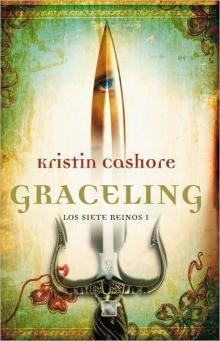 Graceling
Graceling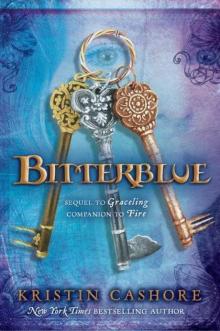 Bitterblue
Bitterblue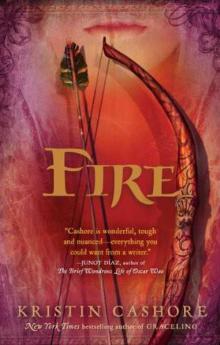 Fire
Fire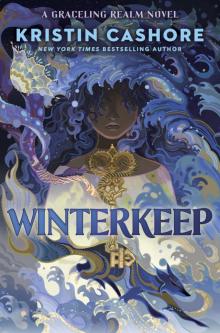 Winterkeep
Winterkeep Helen Keller in Love
Helen Keller in Love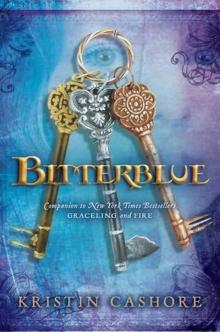 Bitterblue skt-3
Bitterblue skt-3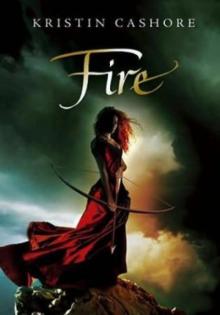 Fire skt-2
Fire skt-2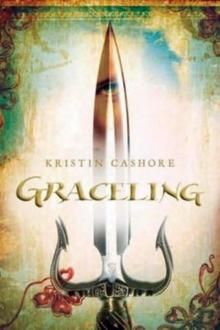 Graceling skt-1
Graceling skt-1